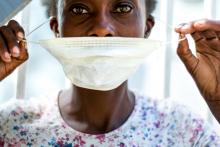Even Before Coronavirus, Haiti was in Crisis
In the New Humanitarian, Jessica Obert writes that Haiti never fully recovered from the earthuqake let alone cholera, political instability, and subsequent natural disasters. While Haitians themselves are resilient their government and the systems that are supposed to be in place to ensue their health, safety, and well being are not. Haiti's ever-fragile economy had already contracted 1.2 percent last year due to protests and the pandemic could result in a contraction of 2.7 percent this year according to the Haitian Ministry of Finance. Physcial distancing does not work well in settings where people are living day to day due to economic hardship. If there are positives, Haiti's population is younger and it has a history of working together with the Dominican Republic on infectious diseases. As with other countries, Haiti will be living with the pandemic for a long time to come.

